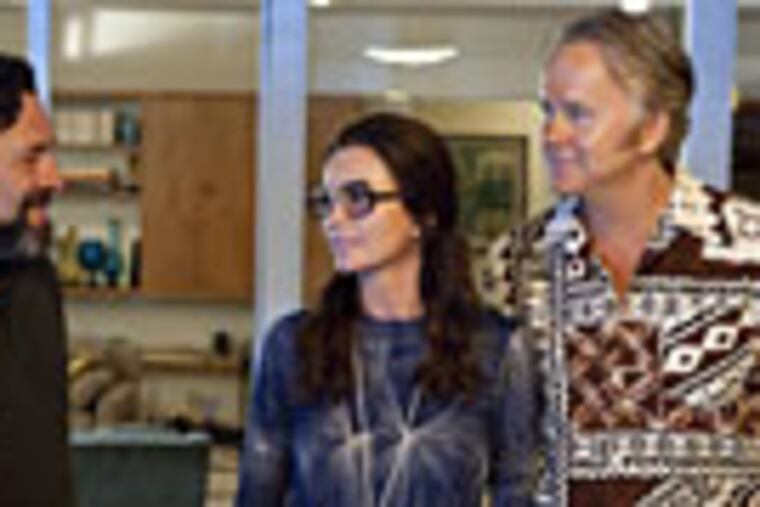Ellen Gray: 'Cinema Verite': True story of the Louds?
CINEMA VERITE. 9 p.m. Saturday, HBO. I REMEMBER THE Louds. Or I thought I did. As a high-school student in 1973, I caught at least some of the 12-part public-TV documentary, "An American Family," that propelled Pat and Bill Loud and their five children into millions of living rooms.

CINEMA VERITE. 9 p.m. Saturday, HBO.
I REMEMBER THE Louds. Or I thought I did.
As a high-school student in 1973, I caught at least some of the 12-part public-TV documentary, "An American Family," that propelled Pat and Bill Loud and their five children into millions of living rooms.
I was horrified.
But then, as an adolescent with six younger siblings, I craved privacy, not exposure. The Louds, whose name seemed all too apt, might as well have been aliens, living their lives in a luxurious Santa Barbara, Calif., fish bowl, sounding like TV characters who'd forgotten their scripts.
So when what appeared to be the on-camera disintegration of Pat and Bill's marriage occurred, it seemed to bear no relation to the breakups I was noticing all around me. I didn't blame the times we lived in. Judgmental as any teenager, I blamed the Louds.
I blamed them for letting in the cameras, for being what the nuns had taught me to think of as "conceited," for assuming their affluent, empty existences were worthy of anyone else's notice.
Weirdly, I never thought to blame the people who put them on TV in the first place or who decided what we would or wouldn't be seeing of them.
On Saturday, HBO revisits the forerunner of the genre that would eventually give birth to the table-tipping "Real Housewives of New Jersey" in "Cinema Verite," which stars James Gandolfini as Craig Gilbert, the filmmaker who talked Pat (Diane Lane) and Bill (Tim Robbins) into letting him expose them to what turned out to be a nation of judges and New York's WNET into paying him to do it.
And guess what? The story's even more complicated than it looked the first time.
Whether it's any truer is subject to debate.
Nearly four decades later, the Louds - whose oldest son Lance died of complications of AIDS and hepatitis C in 2001 - appear to have even less control of how they're portrayed than they did when at least they were saying the words.
"We did reach out," Len Amato, president of HBO Films, told reporters in January. "They chose not to participate."
This week's New Yorker reports that the Louds, who "were reportedly unhappy with the script, ended up accepting a financial settlement from HBO for agreeing not to discuss it publicly."
The magazine also quotes Gilbert, now 85, as taking issue with the way his relationships with both Pat Loud and with the couple who handled most of the filming are portrayed in the film and the suggestion that he might have manipulated some of the action.
None of this should surprise anyone who grew up watching what currently passes for "reality" television, where the question of editing for maximum sizzle long ago ceased to be even a question.
Just as 12 hours probably wasn't enough time to establish the Louds as real people, not soap opera stick figures, two hours isn't quite enough to explain exactly what went wrong with "An American Family," either. The pacing feels off, and it assumes more knowledge of its subject than younger viewers, in particular, may have.
But for those whose curiousity's piqued about the real Louds, WHYY will run the entire series twice on its digital Y Info channel in a 24-hour marathon that begins at noon Sunday.
Still hooked on 'Treme'
John Goodman's character may be gone, but as "Treme" returns this weekend (10 p.m. Sunday, HBO) the bad times - and the great music - are still rolling in David Simon's series about post-Hurricane Katrina New Orleans.
Philadelphia's David Morse is back and becomes a regular this season, frequently playing opposite recent Oscar winner Melissa Leo ("The Fighter"), whose newly widowed character's struggling to keep things together for her newly rebellious daughter (India Ennenga) while continuing to fight the New Orleans police department on behalf of her clients.
Khandi Alexander, Clarke Peters and Wendell Pierce are all back, too, which almost makes up for the return of Steve Zahn as possibly the most annoying character in series television, while Jon Seda joins the cast as a well-connected businessman who sees gold in the city's recovery efforts and wants his cut.
If you didn't like "Treme" (still pronounced truh-MAY) last season, I'm not sure anything I could say about the first several episodes of Season 2 would bring you back. It remains, stubbornly and triumphantly, what it was: an unhurried exploration of the aftermath of a city's catastrophe, told through the experiences of those who didn't have the luxury of shutting off CNN when they'd had enough. And all set to some extraordinary music.
And, no, I haven't yet had enough.
Send email to graye@phillynews.com.